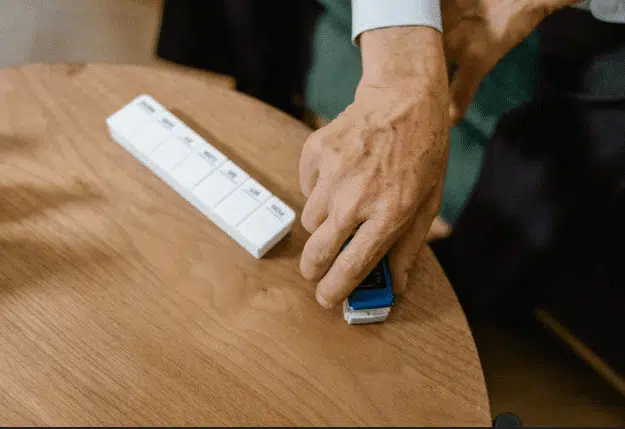Safely Managing Medication
Posted in Medication Safety for Seniors
As we age and our medical needs change, doctors will often prescribe medication to manage existing conditions and promote long-term health. Prescription medicine is a lifeline for seniors managing chronic conditions, but success depends on closely following the directions given by your doctor.
Below are some simple tips and tricks for staying on track with your prescription medications.
-
Take notes at the doctor’s office
A visit to your doctor’s office can generate a lot of information in a short period of time. As a result, don’t be afraid to bring a pen and paper into your appointment. If your doctor prescribes a new drug, be sure to note what they are prescribing, how frequently it should be taken, and any possible side effects your doctor notes to watch out for.
While most of this information will be on your medication bottles, writing this information down can help this information stick when you get home.
-
Purchase a pill organizer
Even if you are only prescribed one type of medication, a 7-day pill organizer can go a long way towards ensuring you do not miss a dose. If you are asked to take medication at multiple points during the day, consider a pill organizer with multiple slots for each day. 
Keep your pill organizer in a part of the house where you spend most of your time. Additionally, don’t be afraid to stick post-it notes to the top of each container with the time of day the medication should be taken, as well as any additional notes, like whether it should be taken on a full or empty stomach.
-
Make a daily checklist
If you already have a calendar or daily planner in your home, consider adding a space to check off the medication you have taken that day.
To make this easy, pick a color of marker or highlighter for each type of medication you take, and add a check mark when you have taken the corresponding medication.
-
Set reminders
Smart phones allow you to set recurring daily timers and can be named with the type of medication to be taken at that time.
If you do not use a smart phone, or you do not keep it with you for long stretches of time, consider a slightly more analogue approach – purchase inexpensive alarm clocks and label each one with the type of medication to be taken. Set the clocks to the correct time of day for each medication and place these near your pill organizer.
-
Store medication properly
Different medications have different storage requirements, and failure to follow these requirements can result in medication losing potency or potentially causing negative side effects.
When you visit the pharmacy to collect new medication, be sure you fully understand the storage requirements and follow them closely.
No matter what you are prescribed, it is generally recommended NOT to store medication in your bathroom. Steamy showers and other sources of moisture are almost universally bad for prescription drugs.
-
Only use one pharmacy
Whenever possible, only rely on one pharmacy for your medication. This will benefit you in three significant ways.
First, developing a friendly relationship with your local pharmacist will help you feel comfortable if you have questions about your medication. As you continue to work with one pharmacy, they will be able to provide better guidance based on your specific needs.
Second, receiving all your medications from one pharmacy makes it much easier for your pharmacist to identify possible negative interactions between various medications you take.
Third, having a one-stop-shop for medication will save you time and make staying stocked on medication significantly more convenient.
-
Refill prescriptions before they run out
Many medications depend on being taken at regular intervals to take full effect. As a result, skipping doses while you wait for a refill should be avoided whenever possible.
If you are using a calendar to track your medication intake, be sure to add reminders to refill your prescriptions when you are down to about one-quarter of your supply.
-
Keep a list of your medication for emergencies and travel
Knowing what medications a patient is taking is a critical piece of information when it comes to emergency medicine. As a result, you should keep an up-to-date list of over the counter and prescription medications you take in an easily-accessible part of your home.
For bonus points, consider writing this information on a small note card you can keep in your wallet in the event something happens while you are out and about. You can even go further and have this card laminated – just be sure to replace it if your medication regime changes.
SelectCare helps New Yorkers live happier, healthier lives in the comfort of their long-time homes by providing in-home caregivers to help with daily activities, including medication reminders and 24-hour support through our staff of RN Field Nurse Supervisors.
If you or a loved one are struggling to manage prescription medication, or an illness is making it harder to stay ahead of other daily tasks, call SelectCare or request a free in-home care guide to learn how we can help.
